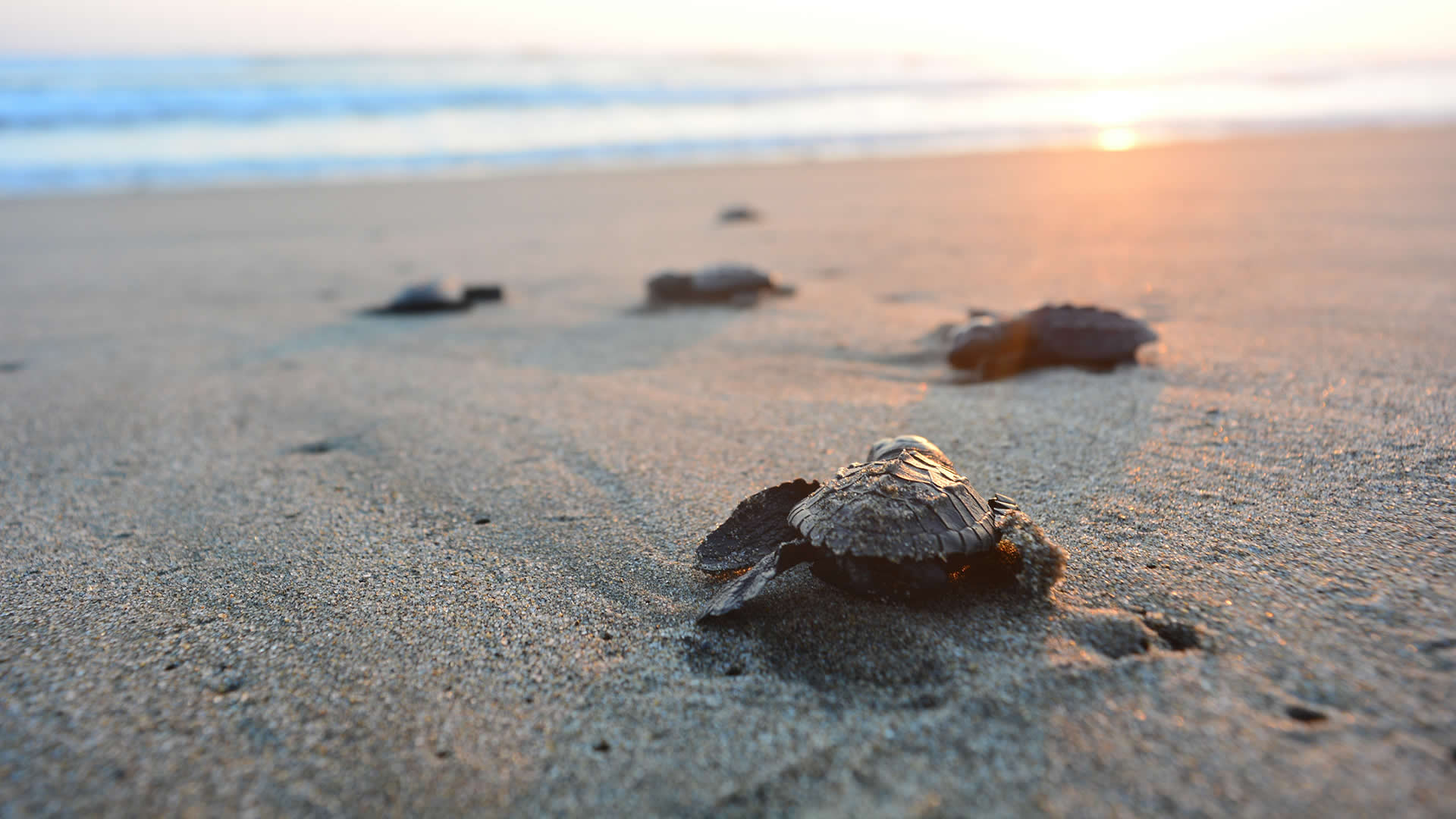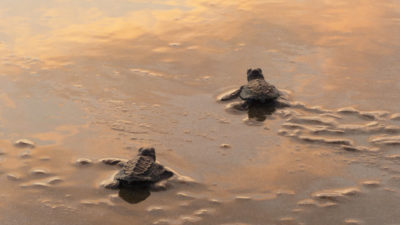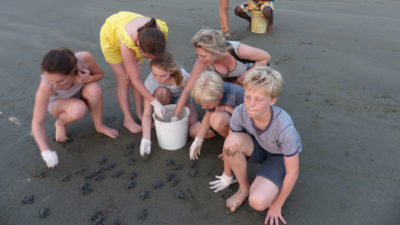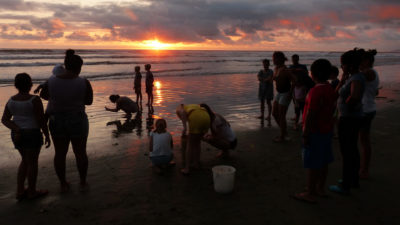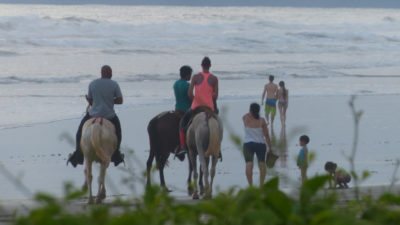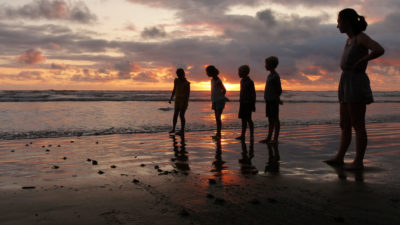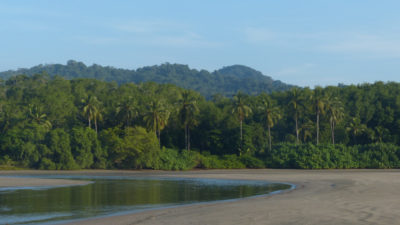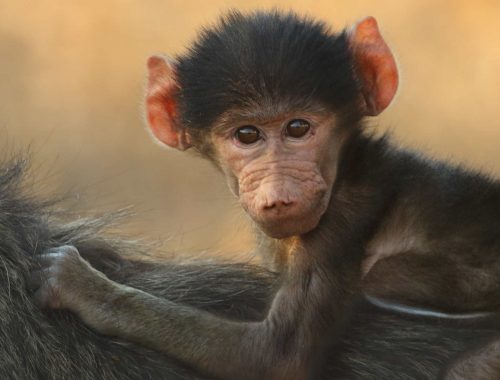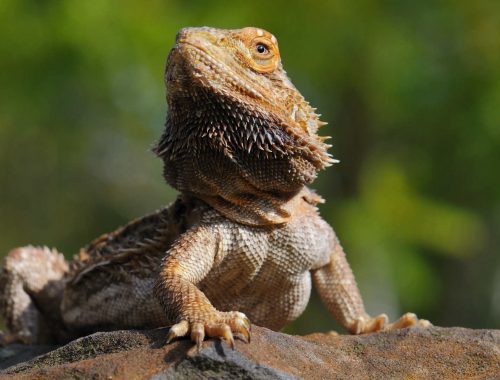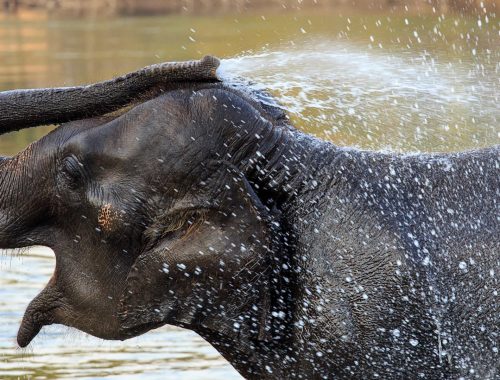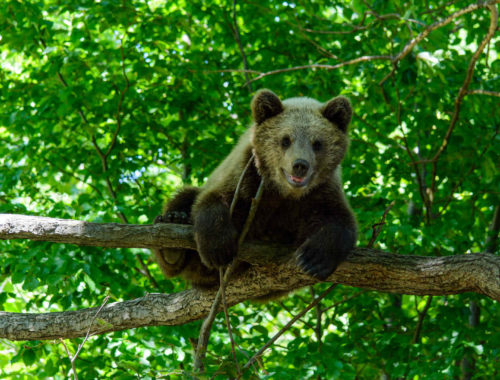Take the ultimate family beach holiday, combining the golden sands of the Costa Rican coast with a turtle conservation trip you’ll never forget. Step off the beaten track and into a remote paradise, living on an unspoiled beach alongside friendly locals, helping to protect both baby and adult turtles from extinction.
Duration: 1 – 2 weeks
Dates: Early July – early December
Arrival day: Tuesday
Return day: Tuesday
Suitability: Recommended for ages 5+
Highlights
- Seeing nesting turtles emerging from the sea under a glittering Milky Way
- Creating wonderful and lasting memories together as a family
- Swinging in a hammock on a golden sand beach looking over the rolling waves
- Meeting local families and be welcomed into the friendly community
- Immersing your children in a life so far away from their own
- Add a conservation career course to support and apply for jobs after your trip
Description
Immerse yourself and your family in traditional Costa Rica, living in a remote village community alongside one of the most stunning stretches of beach that the country has to offer.
Costa Rica, the meaning of which in English is “Rich Coast”, is home to stretches of lush turtle nesting beaches. Despite these safe havens, the turtle population here is in rapid decline thanks to natural predation from animals, industrial fishing and the selling of turtle shell products. Because of this, all turtle species from the Pacific Coast are, to some degree, in danger of becoming extinct.
Working alongside a growing NGO, the local community and other volunteers, you will be protecting nesting turtles and their eggs, and ensuring that more adult and baby turtles can make it safely to the sea. The hard work of volunteers over the past few years has resulted in thousands more turtles making their way out to sea- with more of them surviving to promote future development. This is a vital project, set in one of our most stunning backdrops on the Pacific Ocean.
What will we be doing?
- Night time beach patrols
Most of the volunteering happens at night, when the mother turtles are nesting. You will be walking the beach watching for nesting turtles to come out of the sea – an unforgettable sight and one that you and your family will cherish for years to come. If you’re worried about the slightly different sleeping patterns, the kids are often the ones begging their parents to let them patrol! There is plenty of time in the day for taking a nap and getting in some rest. Your children can also take breaks and head back to the house if the 3 hour patrol is tiring for the little ones. Volunteers are never forced to ‘work’ – this is about your experience!
- Night time data collection
This happens at the same time as the beach patrols. Once the mother turtle is safely on land, you will help to take measurements of the turtle, collect the eggs from the nest and take them to a protected hatchery, where they can hatch in safety. The night time activities are a real highlight for adults and children alike – kids love the hands-on nature of the work, and it is simply glorious to be walking the beach beneath the Milky Way, watching the sea lap on the shore and seeing these beautiful creatures coming up out of the waves.
- Helping in the hatchery
As the turtles hatch, data is collected on the incubation period, weight, length and hatching success rate. The research is linked to a worldwide study, and helps with global campaigns to end industrial fishing close to land. As the baby turtles hatch, families help to release the hundreds of baby turtles to the sea. Last year 15,000 turtles were released back to the sea. Please note hatching occurs from late August at the earliest.
- Becoming immersed in local life
Local children often pop by to practice their English and coax you into some of their games – you are encouraged to join them! Additionally, you may become involved in land and beach clean ups, ad hoc research and data collection tasks, visiting the local school and teaching local children about conservation. Please note the local schools are small and have adhoc days off and exams – this interaction is never guaranteed. You can also join a wonderful reforestation programme, helping to grow and plant saplings in the local area to encourage biodiversity. Talks are arranged so that you can learn about the environmental challenges facing the local community, and how you can help to resolve these issues.
- Enjoying your beautiful surroundings
It’s not all work, with plenty of time to enjoy the beautiful beaches, taste the delicious Costa Rican cuisine and relax in the hammocks between the palm trees. You will have the opportunity to visit a local fishing village where you will learn about sustainable fishing, have lunch with the locals and enjoy a trip into the mangroves. You will find that most afternoons are free to enjoy the location and grab a quick nap. Horse riding and surf lessons can be booked.
When can we go?
- The project is open from July – December, the turtle nesting season
- Mother turtles can be seen throughout this period – nature permitting of course!
- Baby turtles start hatching from mid-August onwards. September onwards offers a higher chance that babies have started to hatch!
Why not add a tour?
Why not enhance your journey to the turtle conservation project with a mini tour of western Costa Rica?
Welcome to our carefully designed voluntourism tour; the ultimate blend of adventure, conservation, and cultural immersion, crafted with you in mind! Whether you’re a solo explorer or a family seeking unforgettable experiences, our tours offer something truly special for everyone.
Immerse in Conservation: Our tours are not just about sightseeing; they’re about making a meaningful impact. From specially curated activities focused on conservation efforts to exploring pristine natural habitats, you’ll witness first-hand the beauty of our Costa Rica and the importance of preserving it for future generations.
Expert Guidance: Meet our passionate tour leaders who are more than just guides – they’re storytellers, conservationists, and ambassadors of their beloved country. With their extensive knowledge and genuine love for their homeland, they’ll ensure you leave with a deeper understanding and appreciation of the places you visit.
Seamless Experience: Say goodbye to endless hours of planning and hello to stress-free travel! With our clear itineraries and all-inclusive packages covering accommodation, and with the option of including transfers, you can focus on soaking in every moment without worrying about the details.
Affordability & Transparency: We believe that sustainable travel should be accessible to all. By offering affordable tours with no hidden costs, you can budget confidently and enjoy peace of mind throughout your journey.
Tailored Experiences: We understand that every traveller is unique, which is why our tours offer a balance of structured activities, free time and optional extras. Whether you’re keen on adrenaline-pumping adventures or serene moments of reflection, there’s plenty of flexibility to tailor your experience according to your interests.
Join us on an adventure of a lifetime, where conservation meets exploration, and every moment is a chance to make unforgettable memories. Let’s embark on this journey together and discover the wonders of our world, one eco-friendly step at a time.
Ready to explore responsibly? Just ask your Destination Manager about one of these three options:
Looking to start a career in conservation?
Are you looking for paid work in the conservation sector after volunteering or interning? Oyster have teamed up with our friends at Conservation Careers who support people to find paid work in conservation following study or a career change. You can add their fantastic and flexible course to your volunteering trip with Oyster. Your Oyster experience will help add interest to your conservation resume as an eye catching addition to your job applications in future!
Accommodation
- Simple beach accommodation in a Costa Rican house with your family
- Bathrooms are shared with your family with refreshingly cool showers
- WiFi available in your family accommodation
- Possibility to upgrade to superior accommodation with a swimming pool and AC for £140 extra per person per week
- AC available in both locations
Food
- 3 meals per day provided at the project site
- Breakfast is a DIY affair – cereals, fruits, toast, spreads etc. You can eat at the station house or prepare food in your family accommodation.
- Lunch and dinner are prepared by the local community- a mixture of traditional Costa Rican foods as well as more western influenced foods – all served in the main station house
- The staple diet is rice and beans, although you will also find a lot of meat, especially beef and chicken, salad, tortillas and soup
- The project caters for all dietary requirements, however please remember that you are in a very rural area and the same products that you are used to back at home won’t be available here
- Dietary requirements can be catered for
Travel arrangements
Airport: San José (SJO) or Liberia (LIR)
Project location: Nicoya Peninsula, 5 hours from San Jose and 3 hours from Liberia. See project location.
Arrival day to project site: Tuesday (recommend arrival around 12:00 midday)
Departure day from project: Tuesday (recommend depart around 8:00 – 10:00am)
Getting to and from the project site: Transfers to the project site are not included in the price, as we find that many families choose to do some independent travel before or after their volunteering, or hire a car. We can however arrange private and coach transfer options from San Jose (airport and city), Liberia (airport and city) and most major tourist destinations in Costa Rica. See here for our price list.
Supporting You
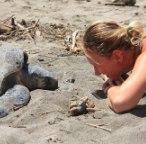
You will be well looked after by our team on the ground in Costa Rica. Working with both expats and locals means that you will be well supported both culturally and linguistically! The coordinators are passionate, friendly and enthusiastic, and are ready to help you to settle in to your new way of life.
Included
- Access to your own personal ‘My Oyster’ account – our online portal where you can find out much more about the program and manage your booking
- Dedicated contact time with an experienced destination manager to discuss the project, answer any of your questions and for us to find out more about you
- Help and advice from our UK office before arrival and whilst you are away
- In-country support
- Pre-departure information covering medical, safety and project advice
- Gold level, 24/7 Pharos crisis management and incident support cover
- Financial protection: ATOL (if we book your flights); IPP (if we don’t book your flights)
- Thorough orientation on arrival
- Accommodation (see the ‘accommodation’ section above for details)
- Advice on visa requirements
- Oyster plants a tree in Africa with TreeAid to help reduce the impact of global carbon emissions
On your return:
- Welcome home pack
- Certificate of Recognition (on request)
- References (on request)
Not Included
- Flights – as an ATOL bonded company, Oyster can book flights for you
- You need a valid passport that meets the requirements of the country you will be travelling to
- Insurance (covering your time with Oyster and any planned independent travel)
- Any costs associated with changing your return flight date if you need to
- Independent travel costs
- Home country travel costs
- Spending money for additional trips, food and entertainment
- Arrival and departure transfers to the project site – we can arrange these for an extra expense (see ‘How do We Get There’, below)
- If you will be flying through the USA you need to comply with US regulations- make sure you have an ESTA (Electronic System for Travel Authorization) at least 72 hours before you leave
- Departure tax from Costa Rica is $28. This is often included with your flight but please check.
More Information
- You and your family will be living in a community of about 200 people on the Nicoya Peninsula in Guanacaste. The town is sleepy and relaxing.
- The location is remote, about 5 hours from San Jose, and this is part of the huge appeal of this project. See the map of the project location here.
- The white sand beach spreads over 3.2km, offering opportunities for horse riding, swimming, surf lessons, rock pools and waterfalls
- A real highlight for families has been complete immersion in the local community. At the right times of year, you can visit the local school to help out with English lessons, play football and volleyball on the beach with the locals, build sand turtles with the village children and even welcome the local kids to the project house for games.
- This is a fantastic way to understand different ways of life, practice a bit of Spanish and really integrate with the local community.
Oyster does not include the cost of transfers to/from the project in our price, as we have found that many families choose to hire a car or do some more travelling before/after their time on the project.
We can however book you a transfer package from San Jose airport to the project if you would prefer this. For the transfer package, you must fly into San Jose on a Monday, and fly out of San Jose on a Wednesday:
The cost of the transfer package is £325 return per person (children under 12 go free). This includes:
- Arrival day to San Jose: Monday. Transfer from the airport to guest house in San Jose
- Arrival day to project: Tuesday. Collection from guesthouse. Coach transfer from San Jose to project site
- Departure day from project: Tuesday. Coach transfer from project site to San Jose. Overnight in guest house
- Departure day from San Jose: Wednesday. Transfer from guest house to airport
We are also very happy to arrange private transfers from major tourist destinations in Costa Rica. Please refer to our price list below. These prices are based on the price of a car for up to four people – depending on how much luggage the group has:
| DESTINATION / LOCATION | TOTAL PRICE OF TRANSFER (GBP) |
| San Jose city | £350 one way |
| Liberia airport (LIR) and Liberia city | £210 one way |
| Tamarindo | £210 one way |
| Manuel Antonio National Park | £420 one way |
| Jaco | £320 one way |
| Nicaragua border | £350 one way |
| Monteverde | £260 one way |
| Arenal/La Fortuna | £330 one way |
| Santa Teresa | £220 one way |
Many people are now looking into family volunteering holidays and those who have taken part in the past have been incredibly passionate about getting their children to experience making a genuine contribution to conservation.
Family holidays abroad have changed in recent years with climate change becoming such an important factor in our modern lives. The sad fact is that the turtle populations around the world are plummeting and your turtle conservation work really makes a difference.
The location of this project is so beautiful and safe that families have loved exploring the local area, getting to know the locals and enjoying a wholly different way of life.
- Beach patrols: Beach patrols take place at night time, as this is when the turtles come out to nest. Patrols usually last up to 3 hours- they include walking up and down the beach looking for turtles and nests, recording data, taking the eggs to the hatchery and releasing baby turtles into the sea.
- Hatchery monitoring: You will spend about 2 hours per day monitoring the hatchery when eggs have been deposited, and this can be in the daytime or the night time. The hatchery is checked regularly at the peak of nesting time and you may be asked to be included in the rota.
- Writing up data / cleaning equipment: You will spend some time each day writing up the data collected on the previous night’s beach patrol, and cleaning down the buckets, gloves and other items used on the patrols.
- Nap time: Most people find that they like to take a nap at some point during the day. As your night’s will be slightly disrupted with the beach patrols, it is good to get in some extra sleep during the day.
- Free time: Meals are served three times a day, and in between these you can explore the coastline, the rainforest, chill out in a hammock with a book and drink fresh coconut juice straight from the coconut. Village communities are centred round the football pitch, so there is plenty of opportunity to get involved with local games. You will find that you live a very laid back Tico lifestyle. Local trips can be arranged in advance of the day you want to travel. Sponsor a turtle or a nest and paint a personal sign – the team will give you updates on your hatchling date or if your turtle returns to nest again! Please note the ocean on this coast is strong and there are often riptides. Perfect for surfing but we recommend you go no deeper than waist height when standing. There are no lifeguards as this is not a tourist beach.
Whilst late-availability is possible, we would advise booking as soon as you can to guarantee your ideal dates. Our projects are very popular and spaces can fill up several months in advance.
- We have always found that kids make the best volunteers – full of enthusiasm and curiosity!
- If you and your family are keen to learn more, throw yourselves into things and make the most of this experience then it is definitely for you.
- Flexibility, a positive attitude and initiative go a long way to making this an unforgettable family volunteer holiday.
- Kids that enjoy using up access energy on long and adventurous beach patrols
- You will find that you are roughing it a bit more than you would at home – the accommodation is basic but comfortable – and you shouldn’t be expecting a kids menu.
- This all contributes to the absolute charm of the location, meaning that you are really living like a local.
The number of turtles that are born and that survive is on the decline. At the beach sites where turtle eggs are protected in hatcheries, approximately 80% of the eggs hatch and make it to the sea. In sites where there is no hatchery, maybe 15% of the eggs will hatch and make it to the sea. In beach sites with no protection whatsoever, the survival rate is even less. The difference here is quite staggering.
Turtle eggs, once laid, are at risk from all sorts of factors. Nests are endangered by racoons, coati, termites and skunks, and if it manages to make it to fruition, the baby turtle’s effort to reach the sea is often scuppered by vultures and crabs! Volunteering on the beaches in Costa Rica means that you can help increase the number of turtles hatching and hence prevent a beautiful species from becoming extinct.
This project is open to people from all walks of life, and as such you should expect to be with a group of volunteers of all ages. We cannot guarantee that there will be other families there at the same time as you. If you are the only family the project will still run with the fantastic research team – this private one on one experience can be very special and bespoke!
Turtles are greatly endangered around the world, and as such this project is created with their conservation and preservation in mind. There are several regulations in place to ensure that the preservation of the turtles is at the forefront:
- When patrolling the beaches at night and a nesting turtle is seen, volunteers must remain quiet and only use the red lamp on their head torches.
- When working around the nesting turtles, volunteers should remain quiet and conduct the research quickly and efficiently without disrupting the nesting turtle
- Eggs are transported from the site where they were laid to a protected hatchery to ensure greater hatching success rates
- On hatching, baby turtles are kept together in one space until they are all hatched to preserve their energy.
- Baby turtles are taken close to the edge of the sea for release. They must walk at least the final 20 metres to sea independently of volunteers so that their muscles strengthen and their navigation is improved
- Volunteers will not interfere with the baby turtles’ progress towards the sea.
- You are not permitted to touch adult turtles unless you are collecting data
- Babies must be handled with gloves
Oyster assesses projects carefully to ensure that they offer high standards of animal welfare and environmental practice. We also check that volunteers understand key points of good practice before working with animals. To find out more, see our animal welfare policy.
- August – October: Green season. Generally high temperatures (20 – 30 degrees celsuius) with sunny mornings and wet afternoons. This is the peak time for nesting turtles, and baby turtles start to hatch from mid August onwards at absolute earliest. Nature however decides this each year so to have a greater chance of seeing hatchlings, we recommend September onwards.
- November – December: End of the green season / beginning of the high season. Generally high temperatures (20 – 30 degrees celsius). It can always rain in Costa Rica, but there is generally a bit less of it in November and December. You can generally see nesting turtles into December, although the majority of sightings will be the babies that you are releasing in this final month.
- There will always be a mixture of sunshine and rain. Nature cannot be guaranteed, so we would suggest booking the dates that work best for you and enjoying whatever happens!
- There is turtle activity throughout July – December, whether it be with adults or babies (or both!).
- The turtle nesting season is July – December, and mother turtles come to lay their eggs on the beach throughout this season. Sadly there are no guarantees that they come up every day however!
- Baby turtles start hatching from mid August onwards, depending when mother turtles lay their eggs
We would recommend budgeting up to £50 per person per week for drinks, treats and trips.
There are no cash machines at the project sites so you will need to have all your money with you for your stay. The closest access to an ATM is an hour away. Costa Rican Colon is not available outside the country so it is best to change some as soon as you arrive. You can also take US Dollars to spend on larger purchases – we recommend this for tours and trips.
Typically you can stay as a visitor in Costa Rica for up to 3 months, although the exact period is at the discretion of the immigration officer on arrival. If you will be flying through the USA you will need to apply for an online ESTA visa before you leave.
You should make sure your passport is valid for the duration of your stay plus 1 day.
You should visit your doctor or travel nurse to find out what vaccinations you will need. There are no compulsory inoculations necessary for Costa Rica but check with your doctor to make sure that your Polio, Typhoid, Hepatitis A and B vaccinations are all up to date. None of the project sites are in malaria risk areas, but getting anti-malarials is up to you, as there are areas in Costa Rica where malaria is found. You should follow your doctor’s advice.
Please see the Fit for Travel website or the UK government’s travel advice page for Costa Rica.
There is a mobile medical unit that comes through the villages, as well as a hospital within an hour of the project.
Costa Rica is considered to be one of the safest countries in Latin America. It is one of the few countries in the world not to have an army! Transfers can be are included in this project, including travel to and from the airport, which means you avoid having to negotiate San Jose. However, if you do have time to spend in San Jose, you will find a lively and buzzing city. The guesthouse included in the transfer package we offer is based close to the city centre in a very safe area. We recommend that you return to the hotel before it gets dark as street lighting is a lot more limited than you might be used to.
At your project site you will be living in a small community which is very friendly and has known and supported this project for many years. The accommodation is lovely and right next to the beach with locks on the doors. The area is beautiful and locals love to show you the area.
The small communities where you will be living have around 200 people. They are approximately 5 hours from the city of San Jose.
- Many volunteers simply enjoy chilling out in hammocks, walking the beach, swimming, surfing, helping in the local community, getting involved at the local school and playing games at the beach with the local children.
- There are opportunities to go surfing with a surf school
- Horse riding on the beach or in the jungle – your choice!
- The beaches are the perfect place for relaxation and exploration as well as protecting the turtles.
- Trips to local schools in the right season – no guarantees however as there are sporadic holiday dates and exams!
- With the amazing wildlife on your doorstep, this project feels a long way from the hustle and bustle of life in busy San Jose.
- There is a tree plantation project in town which is connected to the turtle organisation and volunteers are more than welcome to help and learn about native species
- You can do local fishing trips and mangrove tours with fisherman
- Chill out in the main office in town and make sure of the shops, cafe and bar on Sundays
- Take plenty of books, cards and a board game, writing materials, beach games, bat and ball etc as there is a good amount of free time in between project duties.
- Please note the ocean on this coast is strong and there are often riptides. Perfect for surfing but we recommend you don’t go deeper than waist height when standing. There are no lifeguards as this is not a tourist beach.
Most of the turtle activities take place at night time and in the mornings, so you will find that your days are mostly free for you to explore, relax and get involved with community projects. Top tips: take things with you that you enjoy doing in your free time and be proactive!
There is good WiFi access in all accommodation options.
Signal can be erratic on mobile phones but Wi-Fi is ok!
Costa Rica is 6 hours behind GMT (GMT -6).
In Costa Rica, American 2 pin plug sockets are used.
Supervision will be fairly intensive during the first few days, when you will receive a thorough induction and work-related training. Once you are comfortable with things, you might not always have a supervisor working alongside you, but there will always be staff and other volunteers around to help, and you will always be accompanied for any high risk activities.
Staff at Oyster’s head office and in-country will be responsible for your safety and welfare while you are at the project. This will start from the moment you are picked up from the airport until the time you are dropped back there. Before and after these times, you will be outside Oyster’s responsibility and should make sure that you act safely and avoid risk. This is also true if you choose to leave the project during your time off. We will give you plenty of guidance and advice about this.
Got a question or want to chat to Project Manager Kate who has first-hand experience of the project? Call +44 (0) 1892 771 973or email: – [email protected].
